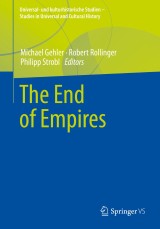Details

The End of Empires
Universal- und kulturhistorische Studien. Studies in Universal and Cultural History
|
90,94 € |
|
| Verlag: | VS Verlag |
| Format: | |
| Veröffentl.: | 21.11.2022 |
| ISBN/EAN: | 9783658368760 |
| Sprache: | englisch |
| Anzahl Seiten: | 792 |
Dieses eBook enthält ein Wasserzeichen.
Beschreibungen
<p>The articles of this comprehensive edited volume offer a multidisciplinary, global and comparative approach to the history of empires. They analyze their ends over a long spectrum of humankind’s history, ranging from Ancient History through Modern Times. As the main guiding question, every author of this volume scrutinizes the reasons for the decline, the erosion, and the implosion of individual empires.</p><p>All contributions locate and highlight different factors that triggered or at least supported the ending or the implosion of empires. This overall question makes all the contributions to this volume comparable and allows to detect similarities, differences as well as inconsistencies of historical processes.</p>
Introduction.- Antiquity.- Islam/Muslim World.- Africa, Asia, China.- The Americas.- Middle Age and Modern History.- The End of World War I.- The End of World War II and the Cold War.
<p><b>Michael Gehler</b> is professor of history at the University of Hildesheim and Jean Monnet Chair for European Integration Studies, as well as Senior Fellow at the Center of European Integration Research/University of Bonn, Germany and professor (egyetemi tanár) at the Andrássy University Budapest, Hungary.</p><p><b>Robert Rollinger</b> is professor of ancient history and ancient near eastern studies at the University of Innsbruck, Austria, as well as Visiting Professor at the University of Wrocław, Poland (2021-2025) holding the NAWA Chair “From the Achaemenids to the Romans: Contextualizing empire and its longue-durée developments”.</p><p><b>Philipp Strobl</b> is a researcher at the Institute of Contemporary History at the University of Vienna, Austria, and a lecturer at the Stiftung Universität Hildesheim, Germany, where he leads a teaching project funded by the Niedersächsisches Ministerium für Wissenschaft und Kultur.</p>
<p>The articles of this comprehensive edited volume offer a multidisciplinary, global and comparative approach to the history of empires. They analyze their ends over a long spectrum of humankind’s history, ranging from Ancient History through Modern Times. As the main guiding question, every author of this volume scrutinizes the reasons for the decline, the erosion, and the implosion of individual empires.</p><p>All contributions locate and highlight different factors that triggered or at least supported the ending or the implosion of empires. This overall question makes all the contributions to this volume comparable and allows to detect similarities, differences as well as inconsistencies of historical processes.</p><p><b>The Editors</b></p><p><b>Michael Gehler</b> is professor of history at the University of Hildesheim and Jean Monnet Chair for European Integration Studies, as well as Senior Fellow at the Center of European Integration Research/University of Bonn, Germany and professor (egyetemi tanár) at the Andrássy University Budapest, Hungary.</p><p><b>Robert Rollinger</b> is professor of ancient history and ancient near eastern studies at the University of Innsbruck, Austria, as well as Visiting Professor at the University of Wrocław, Poland (2021-2025) holding the NAWA Chair “From the Achaemenids to the Romans: Contextualizing empire and its longue-durée developments”.</p><p><b>Philipp Strobl</b> is a researcher at the Institute of Contemporary History at the University of Vienna, Austria, and a lecturer at the Stiftung Universität Hildesheim, Germany, where he leads a teaching project funded by the Niedersächsisches Ministerium für Wissenschaft und Kultur.</p><div><br></div>
New Insights in Universal History Comparative Research in the Field of Empires First Volume on the Topic

















